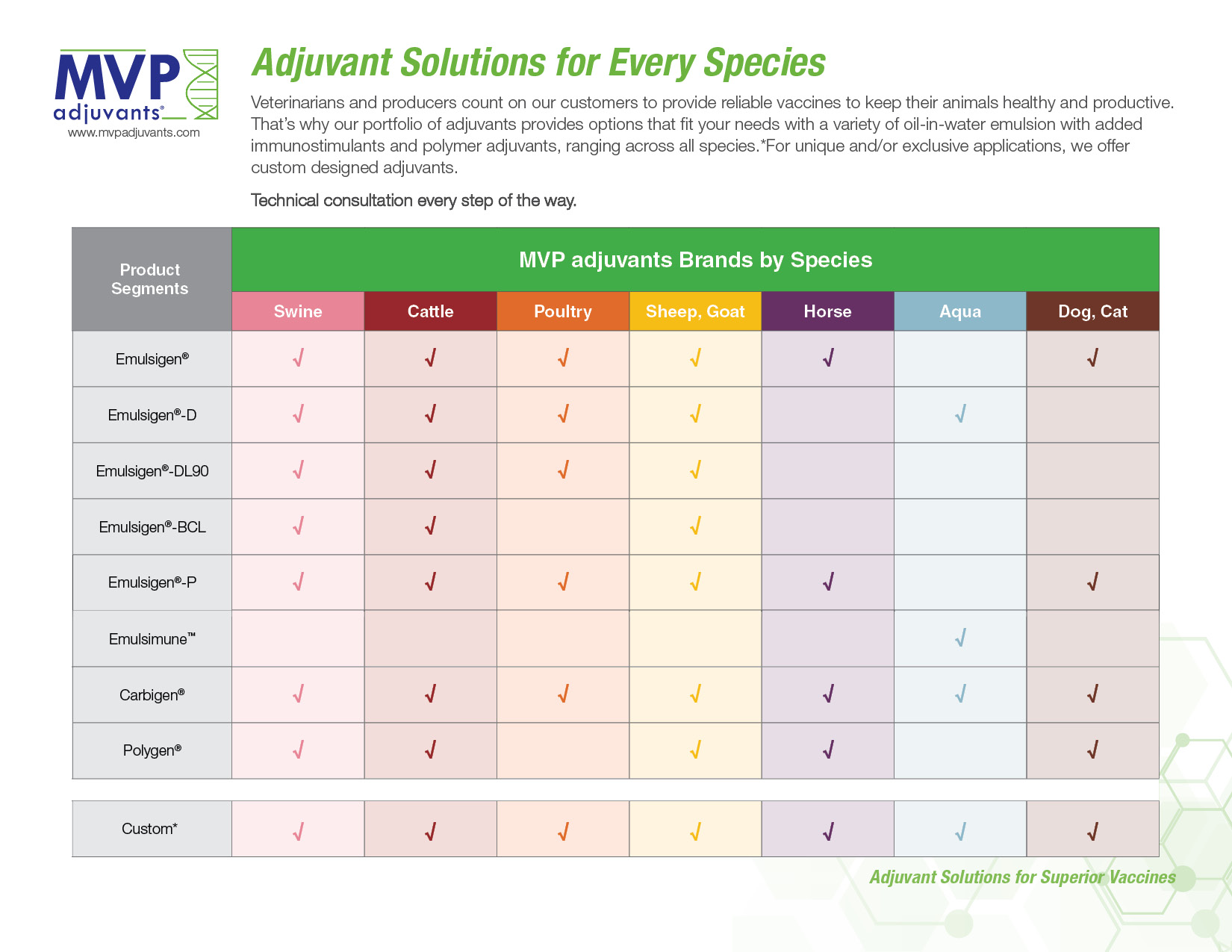About MVP adjuvants®
Our MVP adjuvants® products help veterinary researchers and manufacturers from across the globe improve their vaccines. Not sure what an adjuvant is? Allow us to explain.
The word adjuvant comes from the Latin, adjuvare, which means to help. In fact, any substance that has the capacity of enhancing non-specifically the magnitude of an immune response when it is added with an antigen and injected at the same time, can be called an adjuvant.
Originally, the interest in adjuvants stemmed from the search for a way to increase the humoral immune response to vaccination. Today’s adjuvant technologists are interested in stimulation of specific components of the immune system, including the humoral immune response and various cell-mediated responses. Presently, adjuvants play an important role in the efficacy of vaccines. Stimulating the correct immune response is a must when selecting an adjuvant to use for a new vaccine. Since one adjuvant alone is rarely optimal for all antigens, it is critical to have a selection of different types of adjuvants for evaluation with your antigen and with different animal species. MVP adjuvants products offer a selection of oil-in-water emulsion-based adjuvants, some with additives, and polymer-based adjuvants that have been used in a variety of animal species.
Mechanisms Relative to MVP adjuvants® products
Depot Generation: Depots are produced by adjuvants in order to retain antigens at the injection site and to attract antigen presenting cells (APCs) that begin stimulation of the immune system. The ideal adjuvants bind to antigens so as to provide a slow release to continue stimulation of the immune system over as long a time period as possible. Adjuvant technology requires a balance between the depot effect and reactivity. If the adjuvant remains at the site for too long a period of time, there can be damage to the surrounding tissue. Therefore, adjuvant formulation science involves developing adjuvants that provide a balance between the length of time that the depot exists relative to the immune stimulation produced. All MVP adjuvants products have been optimized as to their generation of a depot effect.
Stabilization of Epitope Conformation: All of the our adjuvant products have demonstrated the capability to stabilize antigen epitopes. It is optimal to mix an antigen with an adjuvant as soon after inactivation as possible. Some live antigens have been stabilized by non-ionic co-polymers Polygen™ and Carbigen™, depending on their pH requirements.
Targeting Antigen Presenting Cells (APCs): Particulate adjuvants, including all of the MVP adjuvants products, have the capability to bind antigens to form multi-molecular aggregates which will encourage uptake by APCs.
Immunomodulation of the Cytokine Network: All of the MVP adjuvants products are able to modify the cytokine network. These adjuvants work by up-regulating certain cytokines and down-regulating other cytokines.
Induction of Major histocompatibility complex (MHC) Class I or MHC Class II Responses: Both adjuvants and antigens are capable of directing antigen presentation by the major histocompatibility complexes (MHC) by means of fusion or disruption of cell membranes.
Note the activity of MVP adjuvants products with swine influenza antigen in the table below.
| Adjuvant | Immunomodulation | Targeting | Presentation | Depot Effect |
| Emulsigen®-D | Th1+++, Th2+++ | +++ | +++ | + |
| Emulsigen®-BCL | Th1+++, Th2+++ | +++ | +++ | + |
| Emulsigen® | Th2+++ | + | +++ | + |
| Emulsigen®-P | Th1+++, Th2+++ | ++ | ++ | + |
| Carbigen™ | Th1+, Th2+ | + | ++ | +++ |
| Polygen™ | Th1+, Th2+ | + | ++ | + |
B.C. Lin, 2006 Personal Communication Stimulation +; Moderate Stimulation ++; Strong Stimulation +++



